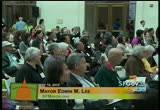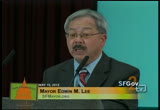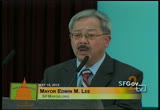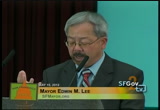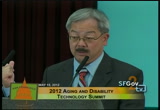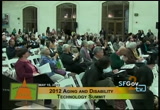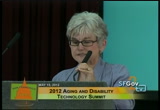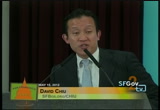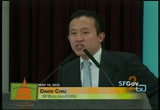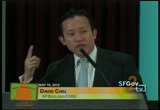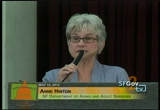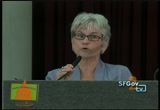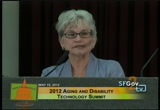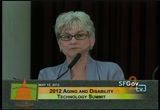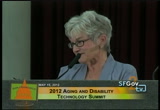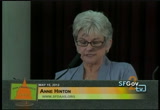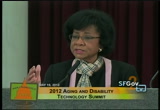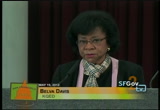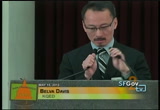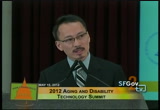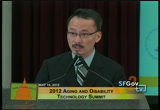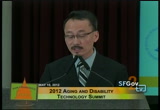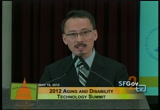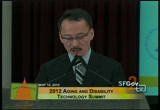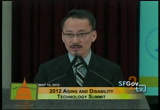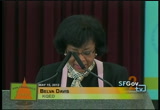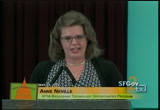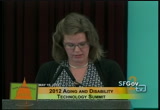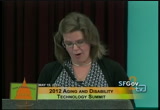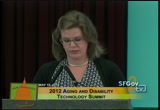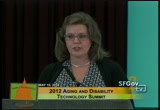tv [untitled] July 12, 2013 7:30pm-8:01pm PDT
7:30 pm
owners of facebook -- you are going to be billionaires' this friday, right? how many of you are going to be billionaires'? well, you're also going to be able to enjoy facebook pages. you're going to be able to send a tweet out. anybody here tweet before? i did not until a few months ago, but you're going to be able to also. anita and i, my wife, tried it this weekend -- you are going to be able to make free video calls. how would you like to be able to talk to family and friends on video on your phone or computer? be able to see family members and friends talk with the right there live. it used to be kind of like "star trek" to be able to do that. you can do that these is a very affordable if you have train yourself on some of the equipment that we have and the resources that we have and be able to do that for the various
7:31 pm
senior centers that you live and work in and enjoy yourselves in. you're going to be able even to read a book online or be able to just have a game and download a game and play with your friends as well. we are all lucky to live in san francisco, because so many of our technology companies have located their headquarters here in san francisco. [cheers and applause] and because they're located here, we can always ask them for a favor here and there and make sure no one is left out, because that is what we do in government. david chiu and i come from backgrounds where we do not want to leave anybody behind. we want everybody to enjoy the riches of technology. we want them to enjoy the economy in san francisco. that is why we're working so hard to make sure our central marketplace is welcoming of all these technology companies, making sure that we can work with other cities. i am very lucky to be part of
7:32 pm
the u.s. conference of mayors, and they allow me to represent san francisco as the innovative center for all the rest of the cities across the country. so we get to compare information and there. what these days i will get to talk to you while i am in washington, d.c., and you can hear what i am saying across there, so we can enjoy it -- wherever i go, you know i will be working and not fooling around. finally, we also are using technology to join our private companies in hiring san franciscans. hopefully some of your kids, some of your grandkids as well, are going to enjoy some of these great jobs in san francisco, because the companies that are here, many of them have agreed to use the virtual hiring practice called hiresf.org and share the technology to hire online send franciscans. we're doing the right here in our great city.
7:33 pm
i have a chief innovation officer, jane, who is working in my office. he keeps a good connection for both me and them members of the board of supervisors to share in what are the technologies and what they're doing in san francisco and what the latest discoveries are that we can possibly use to help improve our city. finally, as someone you know, i celebrated my 60th birthday last week. [applause] and my staff gave me an ipad, and is looking at it -- i might have to go and join your classes to be able to appreciate all the applications that we have there. so do not be surprised if the guy next to you has a mustache. when i leave here this morning, i will be going to rosa parks senior center. we just spent $2 million of federal monies to redo that whole senior center and allow
7:34 pm
that to be one of the sites that will post the technology advances you are experimenting with today. our own residents at every location of our senior centers are going to enjoy the technology advances that we have as a society. this is why we work in a great city like san francisco. we want everybody connected. we want to make sure the san francisco connected program reaches all of our seniors, all of the people with disabilities. there is no reason why people ocean not be connected up, and therefore -- no reason why people should not be connected up, there for everybody gets to enjoy the fantastic technology that we have. this is what makes a great city. this is why i enjoy working with you and being the mayor of our great san francisco city. thank you, ann. congratulations on your third summit. thank you very much. [applause] if brian roberts is in the room, thank you for writing that
7:35 pm
print. it is wonderful for getting us to where we are today. thank you very much. -- thank you for writing that grant. [applause] >> it is true, there are a lot of wonderful things about san francisco. there is all of us. there is all that marvelous food. and we have terrific leadership. it is important that we have good leadership in the departments, the mayor's office, and in our budget office. but, likewise, really important that we have great leadership in our board of supervisors. david chiu is the president of our board, and he knows the issue of technology, plus many other things, a very, very intimately. he probably knows more than any of us will ever -- are ever likely to know. we might wish to know it, but we probably will not because he comes from the technology world. he was the founder and chief operating officer of grassroots enterprise, and online
7:36 pm
communications company. he is also a member of the city's committee on information. and he is -- which sets policies within the city and provide the overall direction for a city and county technology community. he is joined with the mayor lee to attract technology companies to san francisco and connect them to our communities. it is with a great deal of pleasure that i introduce to you the president of our board of supervisors, david chiu. [applause] >> good morning. thank you. good morning, san francisco. are we already to get connected today? great. i wanted to be here this morning in part because my own start in the technology actually happened in this very building. 13 years ago, i went to the meeting of the board of supervisors and i ran into a classmate of mine. and the two of us starting to talk about -- started to talk
7:37 pm
about, and this was during the first inner -- internet innovation, a web 1.0 world, and we wondered of the internet could help people. this became the genesis of the company i wanted to start the one thing we realized during the first dot com revolution was how many people are unfortunately not connected. whether they be members of the madrid communities, whether they be members of various -- members of immigrant communities, whether they be members of various ethnic endeavors committees, and we definitely knew there were many seniors and members of our disabled communities that were not there. i want to thank ann and the department of aging for everything that you guys are doing to make sure that all of san francisco is connected. the mayor talked about all the things that can happen once people get online. you can get information about health care, which can make sure that it saves your lives or the lives of those you love.
7:38 pm
you can get information about how to better use your money, how to invest your money, how to save your money. you can get information about how to learn another language, how to make sure that you're continuing to grow at every stage of your life. and, as the mayor said, you can also learn how to play games with your children and your grandchildren. it took me about five times to get my mother on e-mail, but now that she is on e-mail, she can tell me what to do from 3,000 miles away. [laughter] and that is a good thing. and i think one of the most exciting things about this technology revolution is how it changes constantly. when i was here 13 years ago, i did not have this, nor did i have this. and yet, we know every single year there are new gadgets, new devices, and new ways for us to stay connected, new ways for us to learn and be part of the san francisco community. by all of you being here
7:39 pm
basically in this space, i know you're going to work together to figure out how, as a city, where the most connected city in the entire world. thank you very much for being here. [applause] >> so we just have a few more people that we want to thank. can you hear? a few more people that i want to thank before we head out to have all of our funding. that it -- our fun. that is the planning committee. i do not know how many are in the room, because there were also tasked with doing volunteer work today, not just planning the event. just to mention their names, we have margaret, bill, ella,
7:40 pm
valerie, brian, cammy, cival, stella, denise, david, and i heidi. if you're in the room, please stand, and let's give them a round of applause. [applause] now, every event really needs to have a planning committee, and then you have those folks that do. yes a kind of known in my office for having these ideas -- i am known for having -- for having these ideas, but ideas are no good unless you have the folks that can run with it and put it through other and make a day like today happen. so i really want to now focus on the folks who coordinated this whole day for us. delores mcgee, margaret gray,
7:41 pm
marcia, karen, joan, mira, janice, jennifer walsh, fudyjud, candice. are you in the room or are you busy in the other spots? if you are here, please stand up. and a round of applause. [applause] so, all of these folks are listed in your book, and you all have nametags and so do they. as you go out throughout the day, if you see any of these people, i really encourage you to thank them for all the work they have done because it has been an enormous amount of work to a poll today off. but there are two people that i want us to single out for today's event. that is marie jopling and judy otto.
7:42 pm
[cheers and applause] you know how you read in the paper about most famous folks in technology? there are those names, right? those companies and those names we read about every day. but we should all hope for having one of those famous people in our lives, and that is to marie and judy really are. these other two women who i think single-handedly moved me into social networking, kicking and fighting the hallway. because i was not born into technology. i really had to be dragged there. but these two women have really seen the relevance of what social media, what technology can do for all of us, this ability really to connect us, to make sure that we do not miss our families in another part of the world. they have managed to figure out ways that, when it comes to budget time, to use it in the
7:43 pm
most effective way. again, if you see marie or judy today, because i do not think any -- there in the room -- there is judy. a round of applause for judy. [applause] she also makes the best brittle you'll ever taste in your life. marie is not in the room, but she is really behind today's event. she helped with last year's event. have fun. i am reminded that we really are here today to have fun. i think our next speakers are really going to show us the way in that, and then we have a whole afternoon of playing and getting on with things but it is really my privilege not to introduce a lady to you who i have watched really from afar. i have really just had the pleasure of meeting ms. davis in the last few years. i can remember when i first saw her on tv and thought, here is a
7:44 pm
woman filled with dignity and compassion, so articulate, and she really helped us to understand what was happening in the world. you know, most of you know that ms. davis was the first black female journalist in the west. and she really did change the face and focus of news. she has recently written a book that is very important, both for her but for us, because it really tells the story of her life and all that has gone on in the world she has lived in. my angelo was quoted as saying "no people can say they understand the times in which they have lived unless they have read this book." the name of that book is "never in my wildest dreams." belva davis.
7:45 pm
[applause] [applause] >> listen, thank you very much for that generous round of applause. i am going to start out by boring you, telling you what my mourning has been like. because i am is now admitting that i have to do something about my life, number one. without my cell phone today, i probably would not have made it here. because i was where i have a house that i am trying to put on the market, and the traffic from there to here was over two hours. in the meantime, i wanted to let people here know what was going on with me. so with my cell phone, i called a friend who called somebody. they called somebody. and i made it here. because she knew how to use her computer and resources. i am with you. i need more lessons, obviously.
7:46 pm
i had the phone but not the knowledge. we're going to do something about that in my household. we're also doing something about living that far away from the center of everything, which is right here in the city. if you want to buy a house in the country would to a half acres, i have got one for you. it is is the morning as we all evolves, and as my husband and i get closer to 80, both of us have retired two times already. we're now getting ready for a third got around to remember, you could do as many as you like, too, because you're the only one that can say i am tired of doing that and i do not want to do it anymore. that is right. we have some people with real knowledge and not chitchat to come up and tell us how we can age at the same time that we are gaining insight, knowledge, and exposure to a vast universe of information and opportunity. so we are going to start with derek lamb, an aging service
7:47 pm
program specialist for the newly reorganized administration for community living here in region 9, the department of health and human services. he has over 23 years of experience in the field of aging and long-term support services. he served as the aging service program specialist since -- 19, ok. not a kid would say 1906 and in 2006. 2002-2005. we asked him to join us here with some wise remarks. [applause] >> good morning, everyone. can you hear me? all right. well, on behalf of the original
7:48 pm
administrator for the newly created administration for community living, i would like to congratulate the city and county of san francisco for launching the 2012 aging and disability technology summit. it was approximately a month ago that secretary kathleen sebelius said the u.s. department of health and human services announced the creation of this new federal agency, and that is the administration for community living. and in her words, she said "for too long, too many americans have faced the a possible choice between moving to an institution or living at home without the long-term services and support they need." so this new administration for community living will be to helping people with disabilities, as well as seniors, to live a productive,
7:49 pm
satisfying lives. now, as you may be aware, the aging and disability population has been recognized actually at the local and state levels for quite some time now. so the mechanisms for providing support that facility community living have been really brought together into local and state agencies such as the san francisco departments the of aging and adult services that serves those populations since the year 2000. yet, at the federal level, policy developments from a community outreach, and program implementation related to aging and disability services across the nation [unintelligible] across the department of health and human services until now. the obama administration, as well as secretary sebelius, have long been committed to promoting community living and
7:50 pm
finding new means to help ensure that we support the seniors and people with disabilities and making sure the committee is accessible. approximately three years ago, our nation commemorating the 10th anniversary of the homestead decision. in this time, president obama launched the community living initiative on june 22, does a 9 to reaffirm the administration's commitment -- 2009 and to reaffirm the administration's commitment for americans with disabilities and ensuring the full inclusion of all people in our nation. on the very same day, secretary sebelius set up an interagency coordinating council led by assistant secretary cathy green lake, as well as the director of the office of disability, henry klebold, to look at solutions that address various community living.
7:51 pm
and to give people more control over their lives and the support they need. now talking about this new agency, we are bringing together the administration on aging, which you may be very familiar with, the office of disability, as well as the administration on the developmental disabilities into one single agency. this support is growing crosscutting initiatives as well as efforts focused on the unique needs of individual groups such as seniors with dementia or children with developmental disabilities. the day-to-day management of the programs under the administration on aging and the administration of developmental disabilities will relatively remain unchanged, with the current program staff containing the assignments. kathy is now the administrator for the new federal agency. henry, the former director of the office of disability, is now
7:52 pm
the principal deputy administrator and remains a senior adviser to secretary sebelius on issues pertaining to disabilities. so that is the disability committee. we have direct access to the secretary. chairman louis is the commissioner for the administration for now the newly formed intellectual and developmental disabilities. on that the aging said, mr. walker serves as the deputy assistant secretary for aging, advocating on behalf of older americans. now this new federal agency will seek to enhance and improve a broad range of support that individuals may need to live with respect and dignity as full members of our community. this needs to go well beyond health care. it includes the availability of private housing, employment, education, meaningful relationships, as well as social participation. in addition, we will be working
7:53 pm
with the centers for medicare and medicaid services to develop, refine, and strengthen policies that promote independent living among all populations, especially those served by medicaid. we would also look with cms to promote home and community-based services and support. last but not least, i will be remiss if i forget to mention that may is also the time of the year when communities across nations come together to celebrate the older americans month. the proud tradition that shows our nation's commitment to recognize is the -- recognizing the contributions and achievements of our seniors. the theme for this year is "never too old to play." we want to encourage older americans to be engaged, active, and involved in your own lives and in your own communities. in closing, thank you so much for inviting me to speak at your
7:54 pm
summit. we wish everyone the very best, and we want to commend san francisco for again launching this important event today, and that is connecting seniors and people with disabilities to a world of possibilities. thank you very much, everyone. [applause] >> i think this program certainly is set up in the right order. learn something about your topic, and when you go to play, you'll understand the importance of what you have learned and you can feel smarter about it. we have a lot of smart people that are going to be on the stage here. right now, it is ann neville's turn. she is part of the initiative. in that capacity, she is responsible for both the development, the national broadband man up, and grants states to support broadband, not a collection.
7:55 pm
and these days broadband capacity in leadership effort. this is a very important job, believe me. i belong to a committee in washington called the minority media coalition, and our job is to stay on the federal agencies to make sure that minorities, those who consider themselves elderly and in need of help, and the disabled are included in this new world. so please welcome ann neville. [applause] >> good morning. can you hear me? good. well, thank you, everyone here today for the aging disability technology summit. it is an honor for us to be here today to support this important event for the city and county of san francisco. my name is ann, and i direct the
7:56 pm
state broadband initiative of the national telecommunications and information administration, which is in washington, d.c. our agency and tii is part of the u.s. commerce department, and it is the executive branch agency that is in charge of advising the president on telecommunications and information policy issues. we are at the forefront of the obama administration's push to establish a broadband foundation needed to support the innovation economy in the united states. we are looking to produce better and new jobs and position to ensure that america remains at the forefront of the economy in the 21st century. we are working to ensure that all americans have the resources and the skills necessary to fully share in all of the possibilities, civic, social,
7:57 pm
and economic. all of these made possible by the internet. that is one of the reasons we are here today. he discovered for the administration is the broadband technology opportunities program or btop. this program was established in 2009 by the american reinvestment and recovery act and is administered by ntia. we have nearly $4 billion invested in roughly 230 projects across the country, all aimed at expanding broadband access and adoption in the country. and i want to tell you a little bit about the programs and then tell you about why we care so much about this issue. so, we have the btop for infrastructure projects. these are building broadband networks in areas that are currently underserved. they are making sure that hospitals, schools, and other vital community institutions
7:58 pm
have the access that they need to make sure that they can compete in this economy. these projects are also going to spur private sector investment, and they're also going to increase availability for consumers at home. we also have btop computer centers. they're located in schools, libraries, fire stations, a community points all over the country, and they're providing broadband access to people who are hunting for jobs, to people who want to go online but do not have access at home, because maybe they do not have a computer or maybe they do not know how to use the internet. and we have the btop sustainable broadband adoption projects, like the one we are all part of here today. these projects are teaching computer and digital literacy skills to people who are not yet online and helping them to fully participate in a job market and is society that now takes these skills for granted.
7:59 pm
our portfolio of projects addresses barriers to access and adoption and provide broadband education, training, and equipment to all of these communities. i am here today because the city of san francisco was awarded a nearly $8 million award as part of the sustainable broadband adoption program. [applause] today's summit, the first of its kind, is a real milestone for this award and is something that we can look at across the country as a model. the grant is representative of 43 innovative broadband adoption projects currently being carried out across the nation. as the mayor mentioned earlier, san francisco is establishing or expanding computer labs in 53 locations around the city. these labs are operated by some
8:00 pm
30 different non-profit organizations, housing providers, and community partners. these centers offer accessible touchscreen pc's with software that include brain fitness, microsoft office, and photo- video software in six different languages. english, chinese, spanish, russian, vietnamese, and curry in -- dorean. san francisco -- korean. san francisco has eight sub- recipients the more partners. volunteer teachers at one-on-one coaches in areas such as a social media, a health information, and job skills. this is truly a remarkable partnership, and it is an amazing accomplishment. and san francisco it really is in good company in this regard. ntia has invested $450 million for public computer centers and
51 Views
IN COLLECTIONS
SFGTV2: San Francisco Government Television Television Archive
Television Archive  Television Archive News Search Service
Television Archive News Search Service 
Uploaded by TV Archive on

 Live Music Archive
Live Music Archive Librivox Free Audio
Librivox Free Audio Metropolitan Museum
Metropolitan Museum Cleveland Museum of Art
Cleveland Museum of Art Internet Arcade
Internet Arcade Console Living Room
Console Living Room Books to Borrow
Books to Borrow Open Library
Open Library TV News
TV News Understanding 9/11
Understanding 9/11